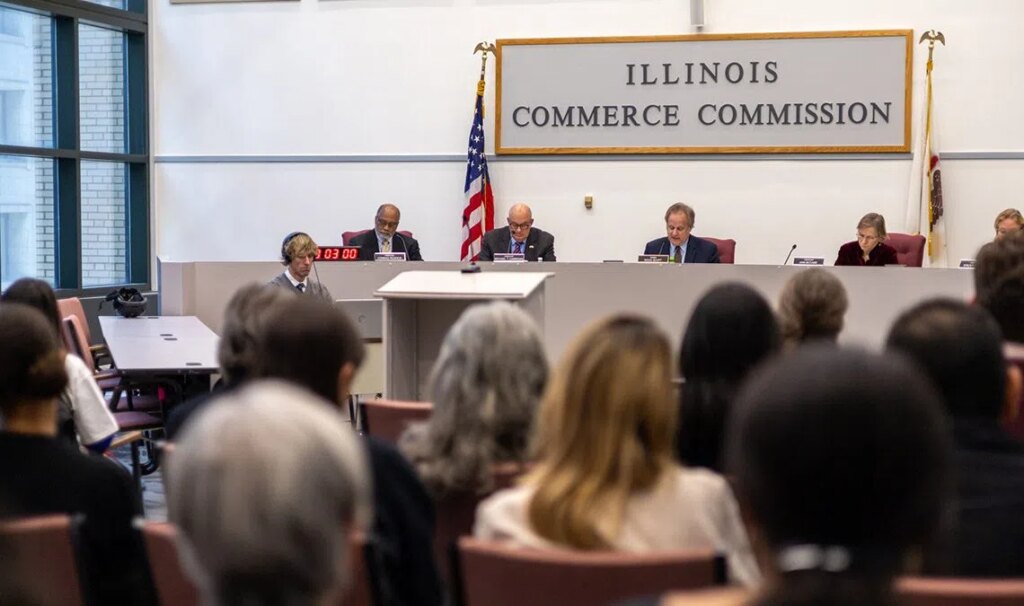Illinois Utilities Prepare for Major Grid Upgrades Amid Regulatory Changes
Illinois’ electric utilities are gearing up for substantial enhancements to the state’s power distribution network, leading to increased customer rates. This development follows the Illinois Commerce Commission’s (ICC) recent approval of revised upgrade plans from Commonwealth Edison (ComEd) and Ameren Illinois, which serve the northern and southern regions of the state, respectively.
The newly sanctioned plans, covering infrastructure advancements over the next three years, emphasize the integration of cutting-edge technologies to support Illinois’ clean energy aspirations while sustaining the current grid framework. The ICC greenlighted $1.5 billion in expenditures for ComEd—a 25% reduction from its initial proposal—and $333 million for Ameren, representing a 75% cut from its original plan. Additionally, Ameren secured extra funding through a procedural appeal earlier this year.
ComEd’s strategy is expected to average an annual $22 increase in residential bills from 2024 to 2027, at which point a new grid plan will be proposed. Ameren has yet to finalize the exact cost impact for its 1.2 million customers, but anticipates a rise of less than a dollar per month following Thursday’s decision.
Read more: After being rebuffed by regulators, utilities file slimmed-down spending plans
The approved rate increases complement those sanctioned in 2023 under separate multi-year rate plans, both part of the 2021 Climate and Equitable Jobs Act. This landmark legislation outlines Illinois’ vision of a decarbonized electric grid by 2045. However, both ComEd and Ameren initially faced hurdles in aligning their plans with the act’s requirements, resulting in a rare ICC rejection of their proposals last year due to concerns about cost-effectiveness.
Over the past nine months, a comprehensive debate among regulators, state officials, consumer advocates, and environmental groups has unfolded, culminating in the ICC’s approval of revised plans. Representatives from both utilities expressed satisfaction with the decision, which provides a clearer path for upcoming infrastructure investments.
“Our primary focus remains our commitment to providing safe, reliable, affordable and sustainable energy to our customers and communities,” stated John Schoen, a spokesperson for ComEd.
Ameren representatives emphasized that while the upgrades involve initial costs, they promise long-term benefits for customers. Matt Tomc, who oversees Ameren’s regulatory policy, characterized the approach as a “pay now or pay more later” scenario.
Read more: State regulators once again flex muscle in rejecting utilities’ grid plans, lessening rate hikes
The outlined upgrades are crucial as Illinois transitions towards increased reliance on renewable energy sources. The plans detail new strategies for managing distributed energy generation, including rooftop and community solar projects, as well as traditional investments in the grid’s “poles and wires” infrastructure. This focus on resilience is also a response to the state’s severe weather challenges.
While some state officials express concern over the state’s long-term clean energy prospects, particularly in generation and transmission, the local grid plans have been praised as a positive step for Illinois’ clean energy policy. Various groups, including consumer advocates and environmental organizations, presented arguments during the regulatory process, influencing the ICC’s final decision.
Brad Klein, managing attorney at the Environmental Law & Policy Center, commended the collaborative efforts in the state’s approach to achieving climate objectives and enhancing the electric grid. “We hope this becomes a model for other states,” Klein remarked.
ComEd has signed a memorandum of understanding with the Environmental Law & Policy Center and other groups to collaborate on future grid planning, while Ameren has made similar commitments. Consumer advocates from the Citizens Utility Board acknowledged the decision as a “step in the right direction” to curb unnecessary utility spending.
“In the face of foot-dragging by Illinois’ biggest electric utilities, this ICC has shown concern for affordability and reducing reckless utility spending,” commented Jim Chilsen, spokesperson for the Citizens Utility Board. “Of course, an increase of any kind will be difficult to bear for far too many customers who have been hit with multiple utility rate hikes over the last decade. We still have a lot of work to do to secure a clean, affordable energy future for Illinois consumers.”
ICC Chair Doug Scott described the decisions as a “first step,” with expectations of refinement and improvement in future plans. Other commissioners anticipate ongoing cooperation among utilities and stakeholders. “The work is not done,” noted ICC Commissioner Conrad Reddick, emphasizing the importance of stakeholder workshops mandated by CEJA for informed debate and robust discussion.
Read more: Worried about grid reliability, state officials seek to boost renewables, energy storage
Original Story at wmbdradio.com
